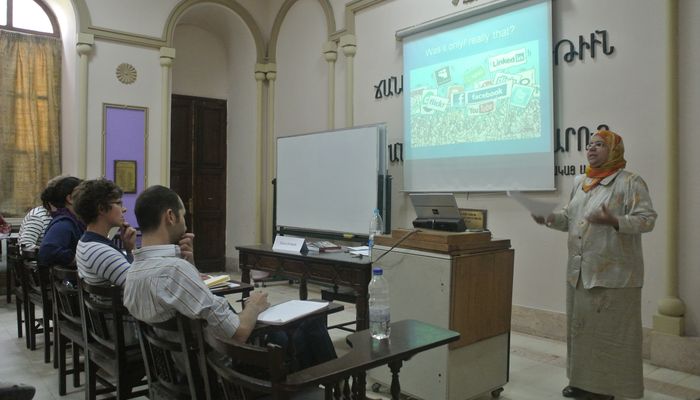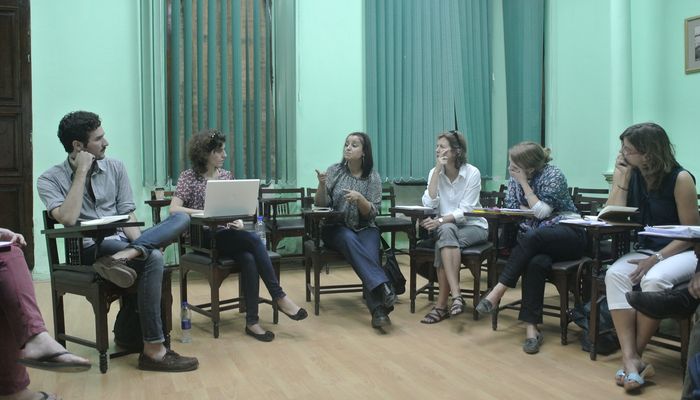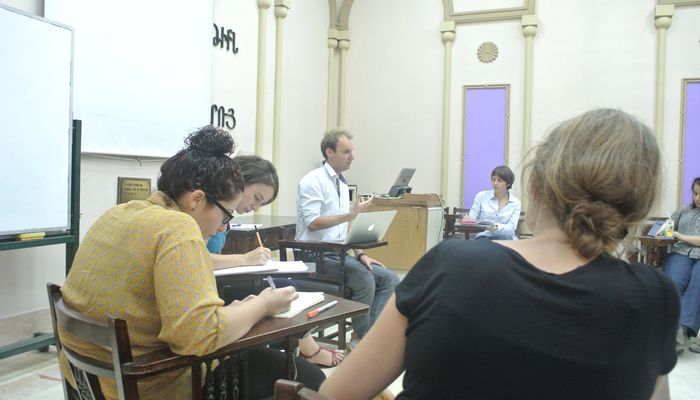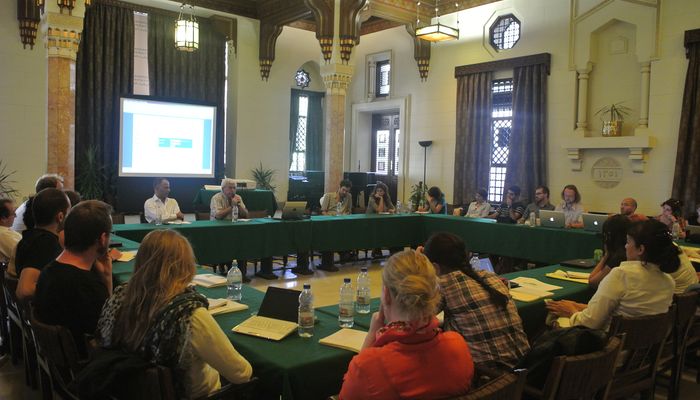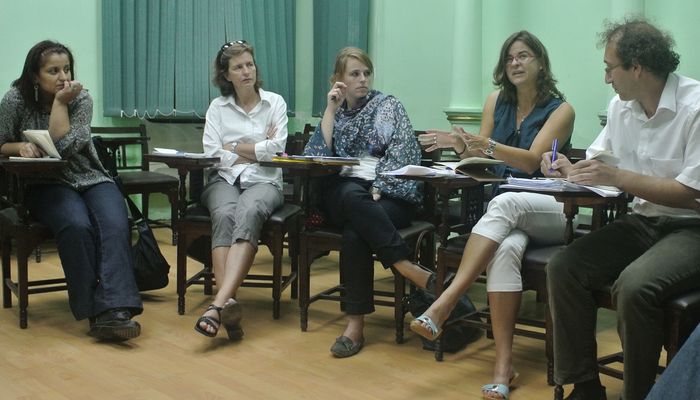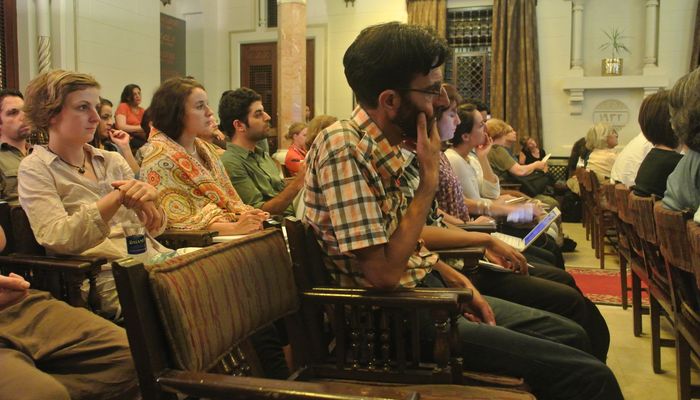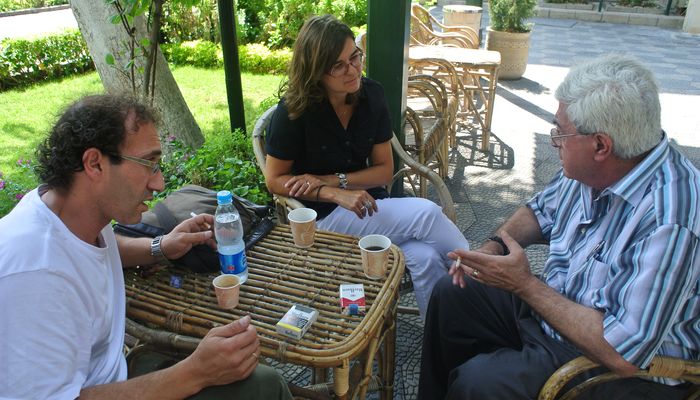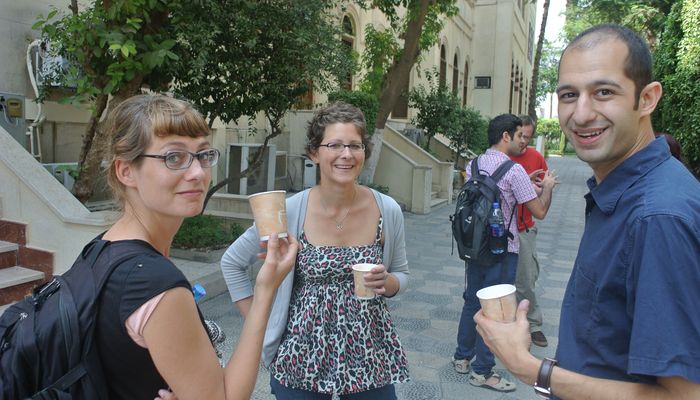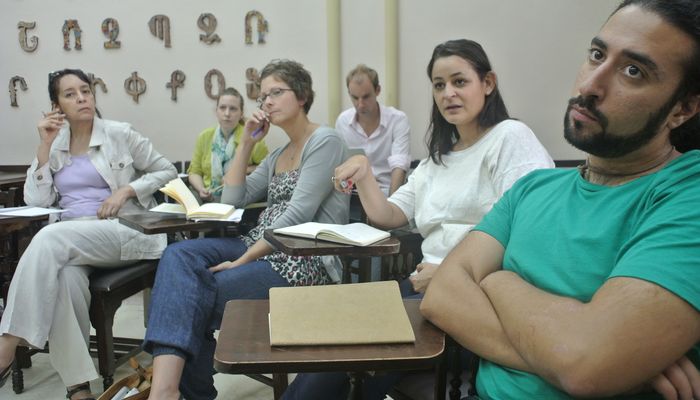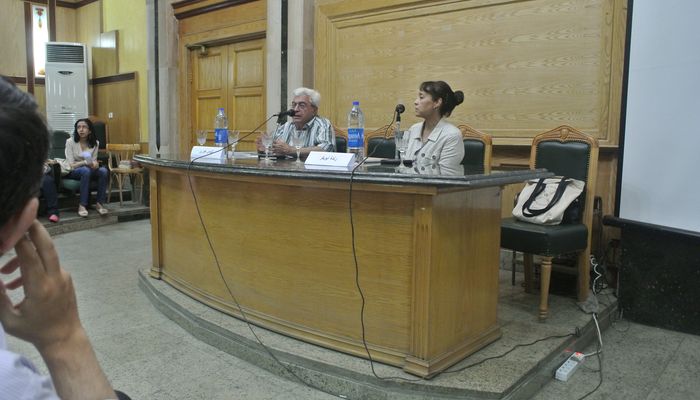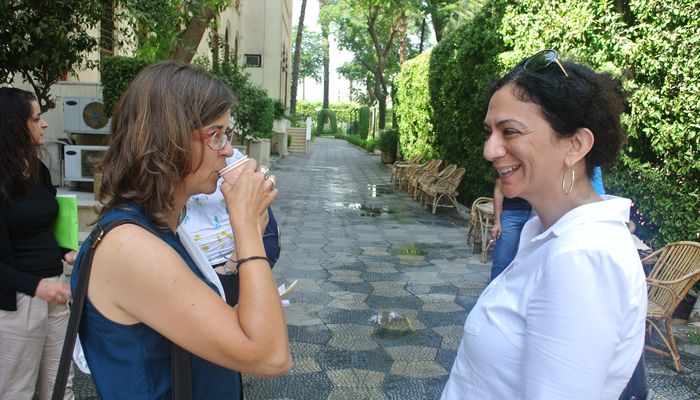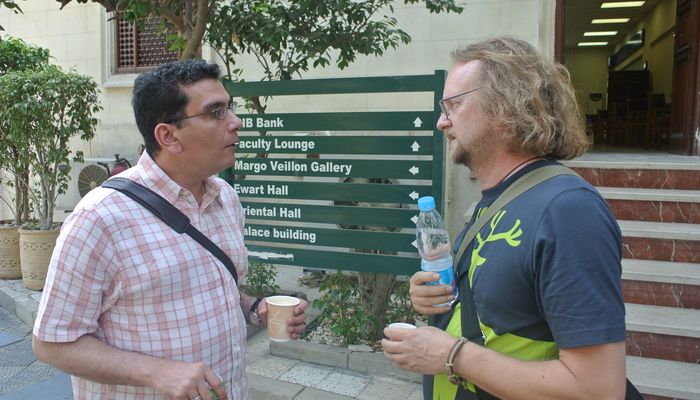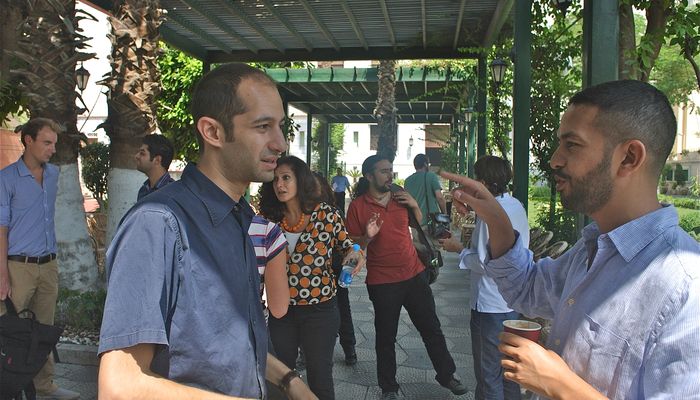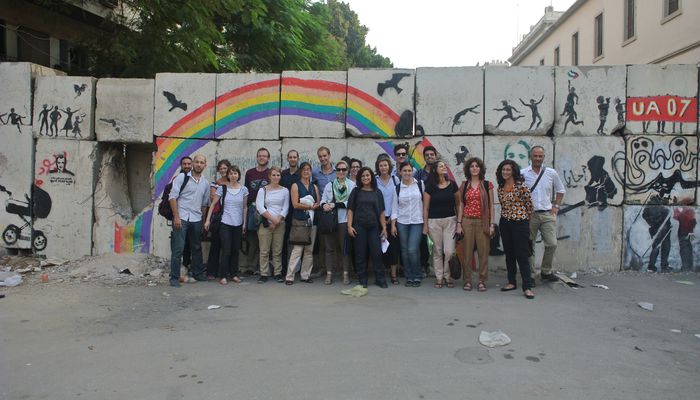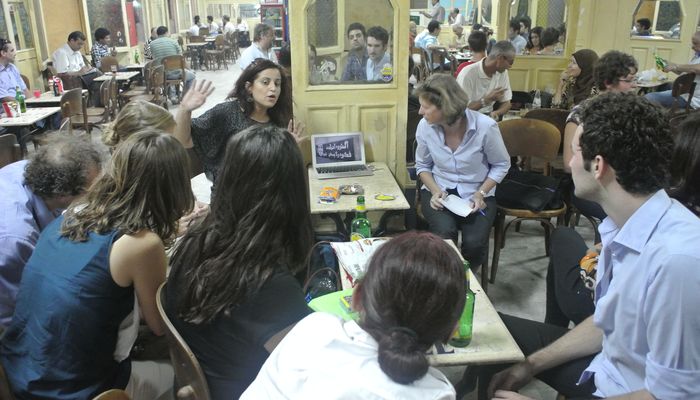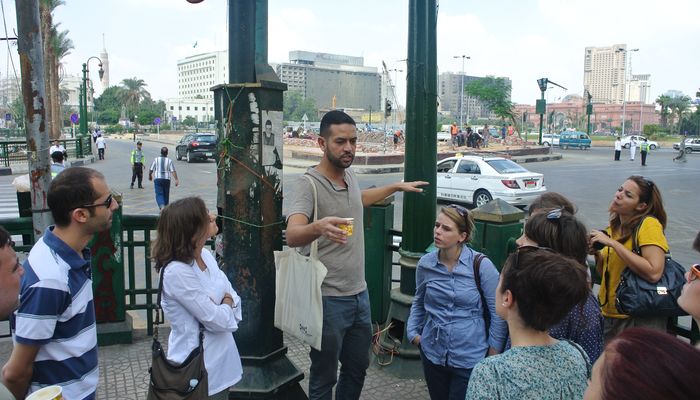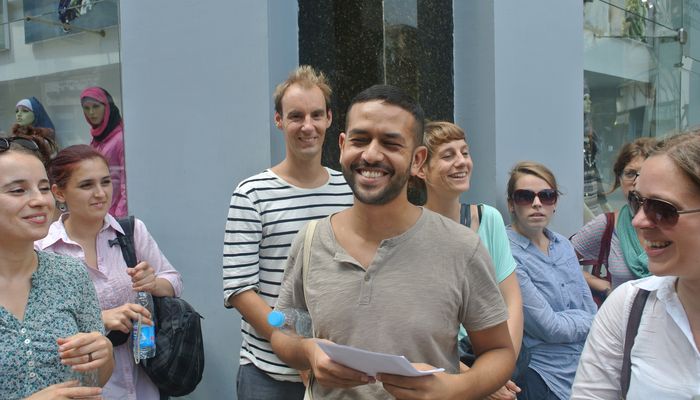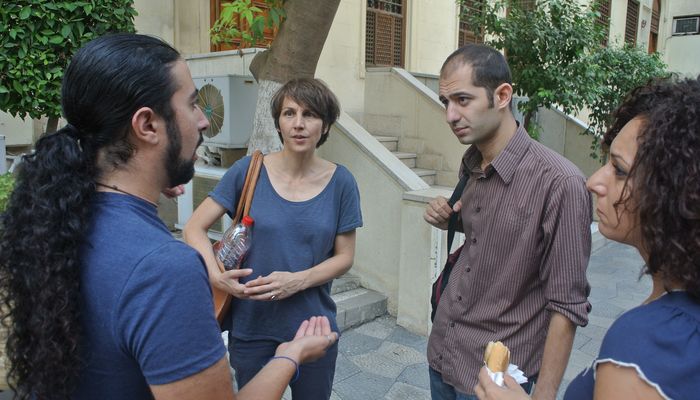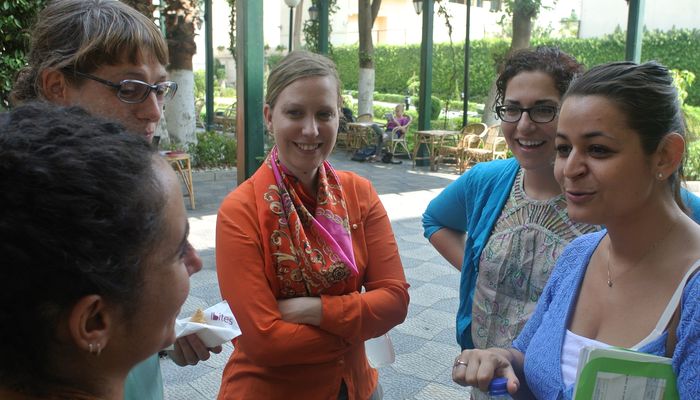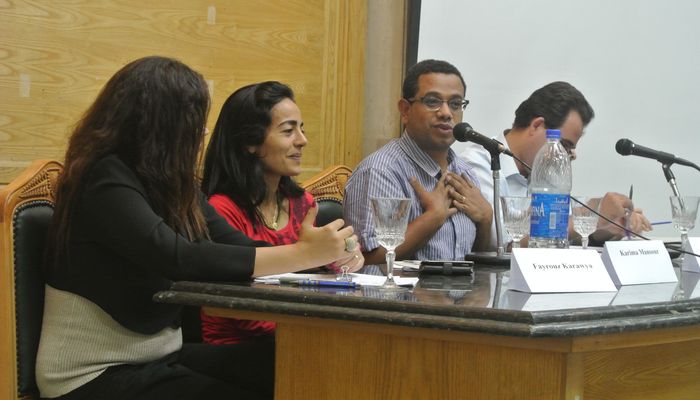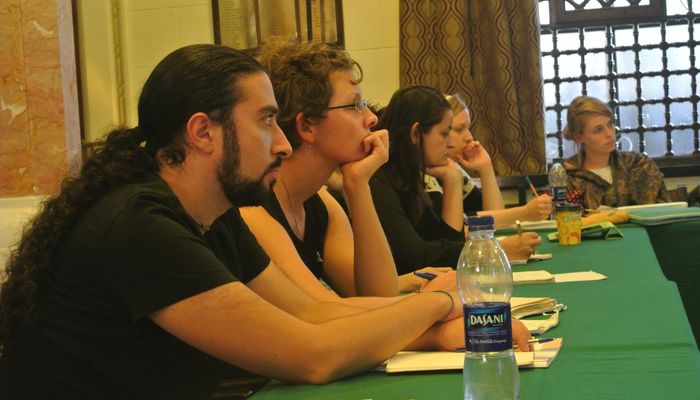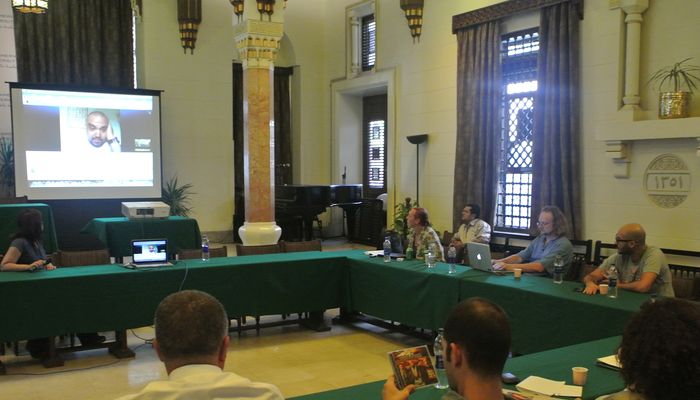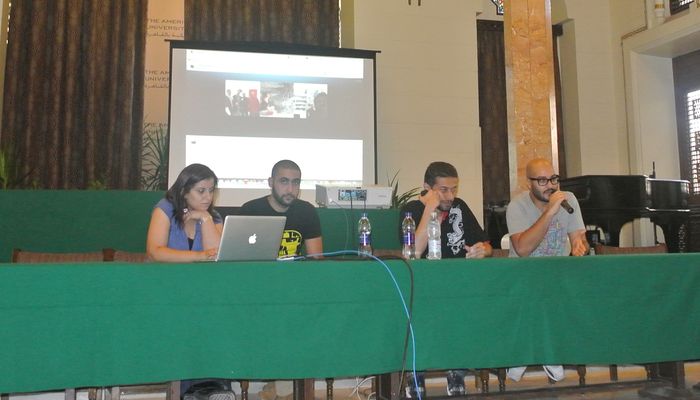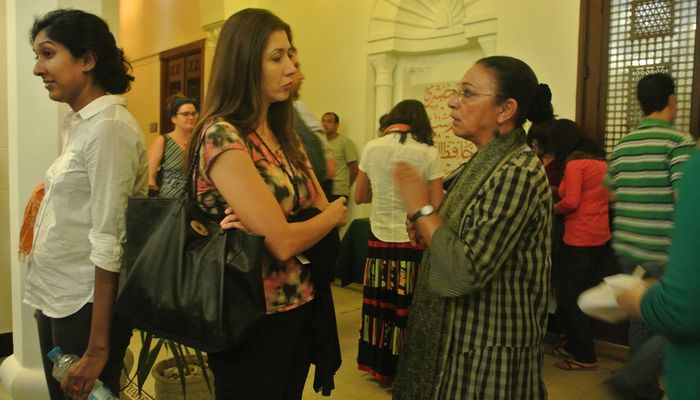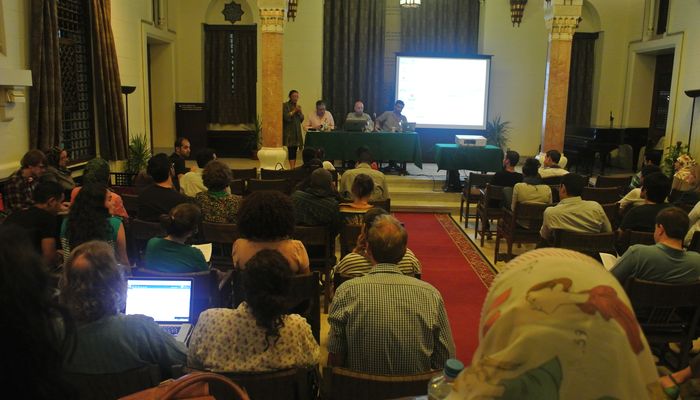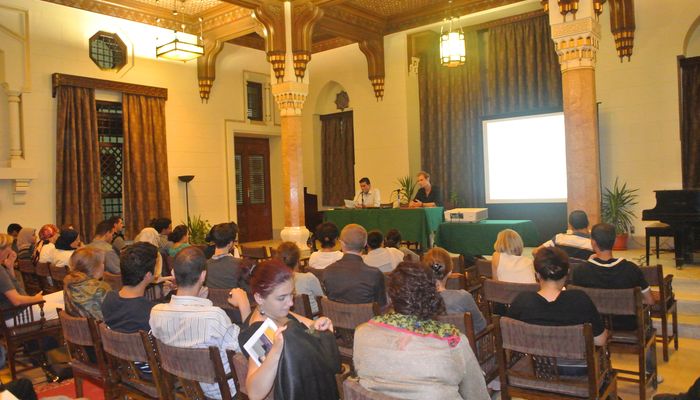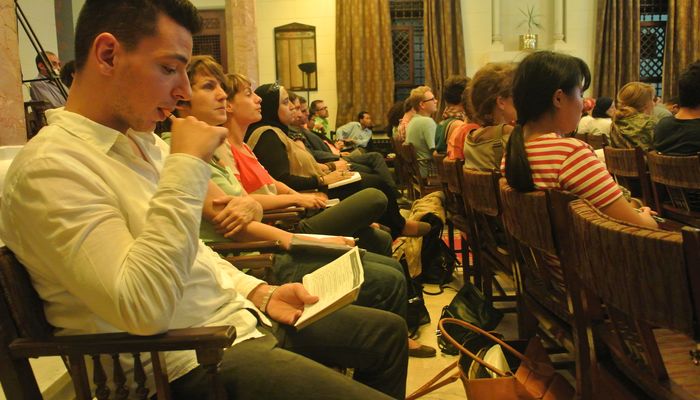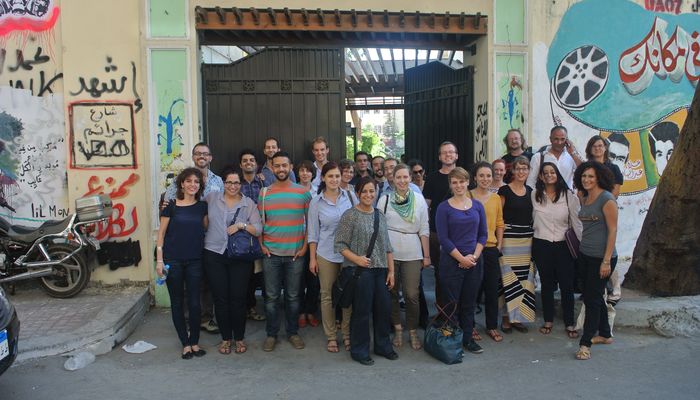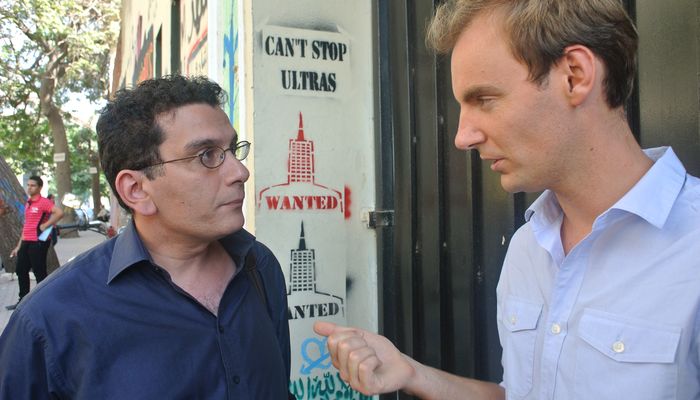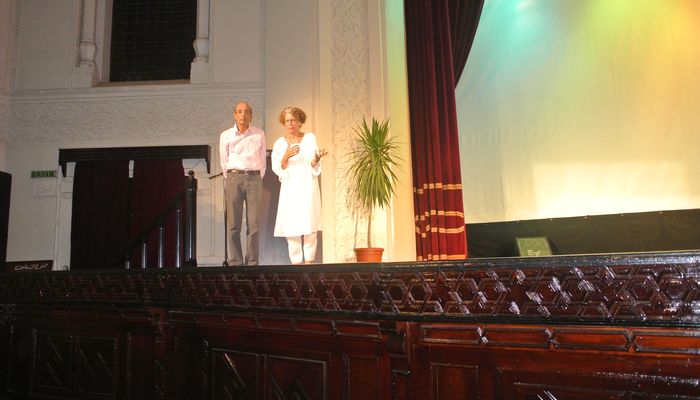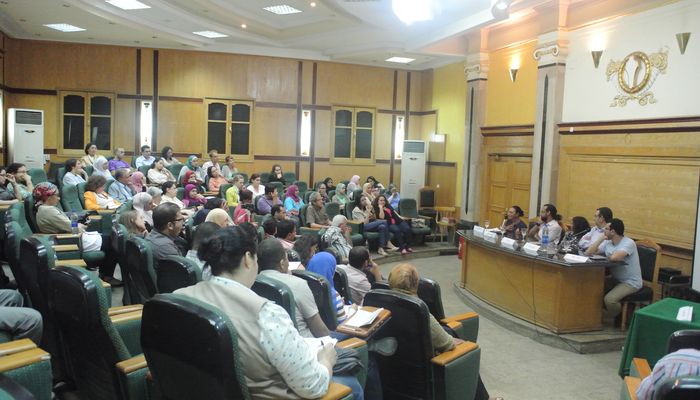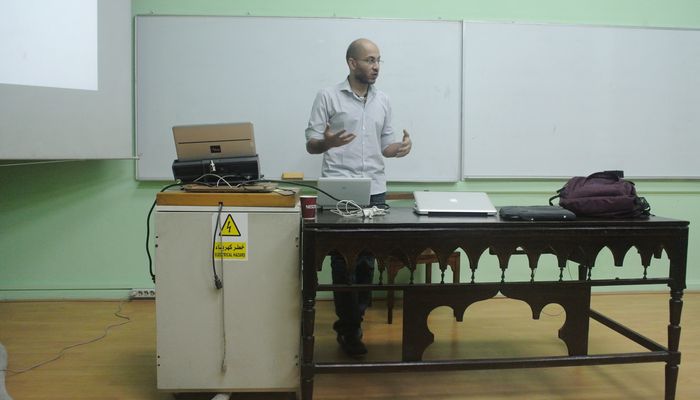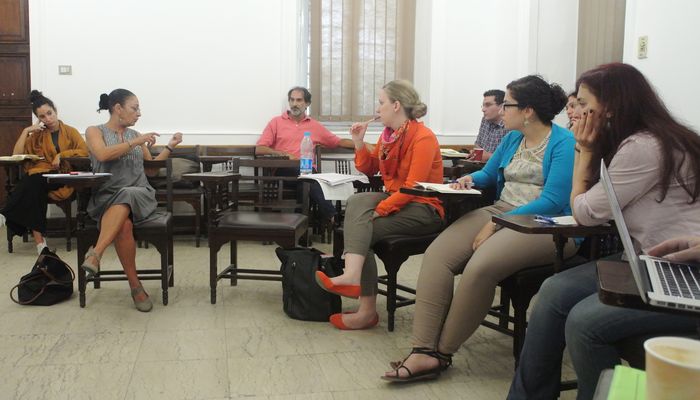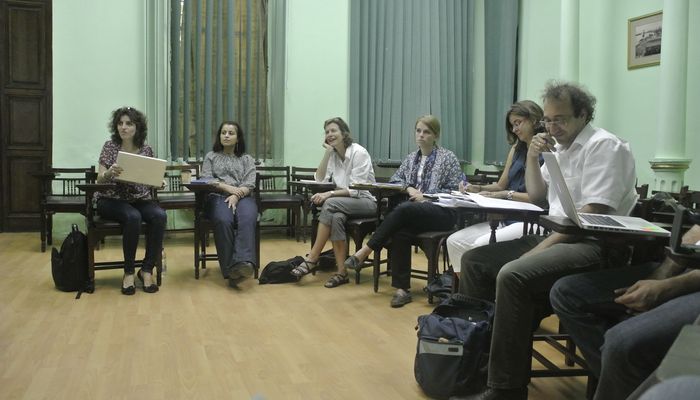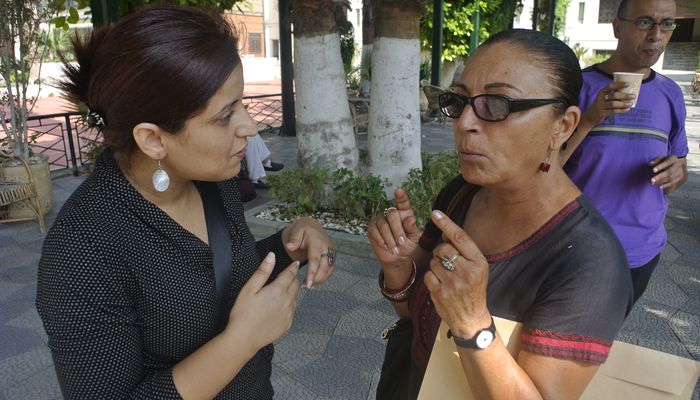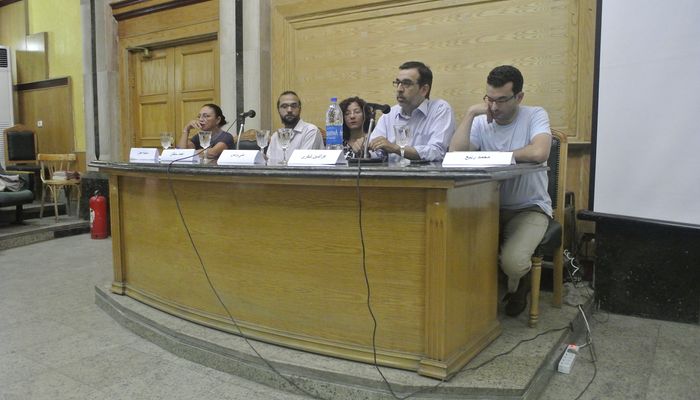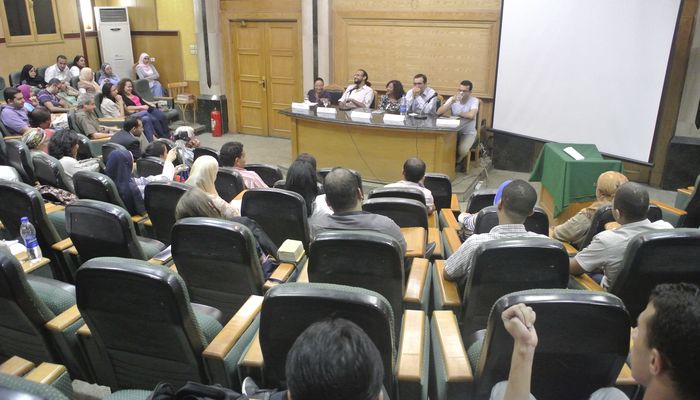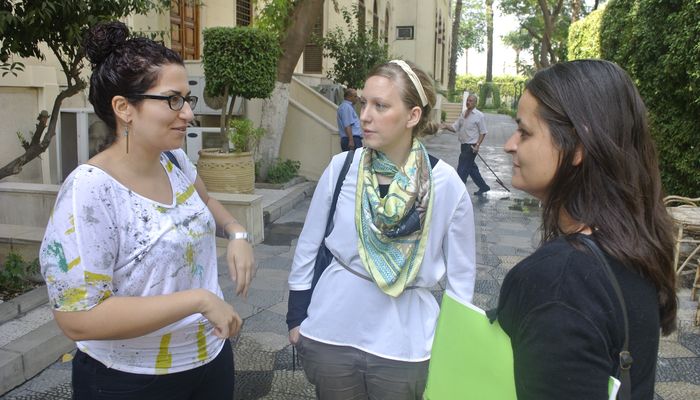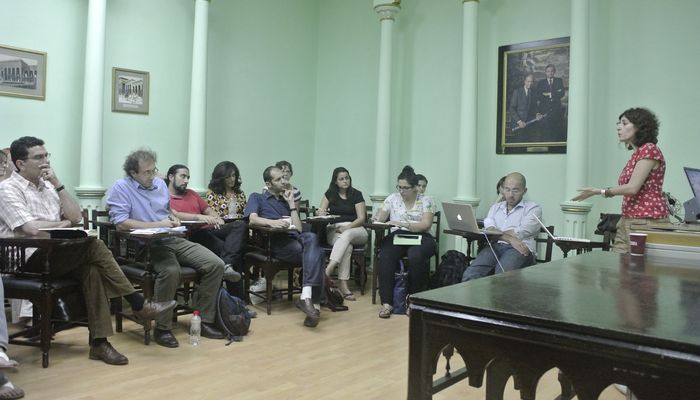“Aesthetics and Politics: Counter-Narratives, New Publics, and the Role of Dissent in the Arab World” was the theme of the International Summer Academy the research program Europe in the Middle East—The Middle East in Europe (EUME) of the Berlin-based Forum Transregionale Studien and the ‘Center for Translation Studies’ of the American University in Cairo (AUC) organized from September 16 — 27, 2012 at the American University in Cairo in cooperation with the English Department of Cairo University and the Center for Near and Middle Eastern Studies of Philipps University Marburg, Germany. The Academy was convened by Randa Aboubakr (Cairo University), Michael Allan (University of Oregon), Ayman El-Desouky (SOAS London), Elias Khoury (NYU/Beirut), Samia Mehrez (AUC), Rachid Ouaissa and Friederike Pannewick (both Philipps-Universität Marburg).
Aesthetics and Politics: Counter-Narratives, New Publics, and the Role of Dissent in the Arab World
In cooperation with the English Department of Cairo University and the Center for Near and Middle Eastern Studies of Philipps University Marburg, Germany
AUC Cairo
Please find here a report of the Summer Academy, the media feedback, the complete program, the brochure for the public program, the original call for applications and audio recordings of the public lectures and discussions below.
The Summer Academy is designed to support scholarly networks and contribute to closer ties among research activities in and outside Europe and the Middle East. Academics and Artists are encouraged to explore aesthetic forms in the broadest sense—not in only literature, but also in new media, music, film, performance, fashion and street art.
The uprisings in the Arab world have challenged traditional paradigms for understanding culture and politics in the region and have opened up new sets of questions in both spheres. ‘Revolution,’ as both concept and practice, has at once enabled innovative modes of critique, imaginings of new utopias, re-signified subjectivities, as well as communal solidarities. What are some of the new terms, frames of understanding, and transformations that have begun to crystallize through the political and cultural changes in the aftermath of the Arab uprisings? In what ways do the uprisings across the Arab world reformulate the relationship between politics and culture in and outside the region? How could the role of dissent and counternarratives in the political process be understood? And how should the place of literature and the arts in this new context be conceived? How might key political terms inspired by the Arab uprisings emphasizing freedom, human dignity, and social justice be understood and deployed —and what do these terms mean in the academic contexts and beyond?
For a period of two weeks 34 doctoral, post-doctoral, and advanced researchers from different academic disciplines, from Europe, the Arab World and the United States discussed the relationship of Aesthetics and Politics in relation to the ongoing transformations in the Arab World on the basis of their own research projects, among each other and with academics, artists, writers and intellectuals from Egypt.
The Summer Academy was chaired by a group of scholars that included Randa Aboubakr (Cairo University), Michael Allan (University of Oregon), Ayman El-Desouky (SOAS London), Elias Khoury (NYU/Beirut), Samia Mehrez (American University in Cairo), Rachid Ouaissa (Philipps-Universität Marburg), Friederike Pannewick (Philipps-Universität Marburg), Samah Selim (Rutgers University).
The public program of the Summer Academy was opened on Monday, September 27, with a keynote by Elias Khoury, "Towards an Intellectual-Ethical Code in the Time of the Arab Revolutions". The program included working sessions of the participants and public lectures as "Old Media / New Futures: Fanonian Reflections on the Arab Uprisings" and "The Artist and the Historical Moment: A Testimony" and panel discussions on themes such as “The Role of Intellectuals in the Arab Revolutions”, “Literature, Revolution and Politics”, "Archiving the Revolution", Cultural Policies or the Role of Popular Culture” and involved academics, artists, intellectuals and writers such as Mona Abaza,Yasser Allam, Elias Khoury, Huda Lutfi, Tahani Rached, Emad Abou Ghazi, Ezzedine Choukri Fishere, Mona Prince, Mohammad Rabie, Mona Abaza, Khaled Fahmy, Ahmed Sultan, Sayed Mahmoud , Karima Mansour , Fayrouz Karawya, Tamer El Said, Khaled Fahmy, representatives from the Mosireen Group, from the AUC Student Pilot Project: Wiki Biographical Dictionary of the Revolution.
Please find also the following video links of the Summer Academy on Youtube:
Panel Discussion on September 19, 2012: "Literature, Revolution & Politics":
Welcome by Randa Abou Bakr and Introduction by Elias Khoury (Video)
Ezzedine Choukri Fishere, Mona Prince, Mohammad Rabie, Ahmed Sultan, Samia Mehrez and Discussion (Video part 7 & Video part 8).
Panel Discussion on September 23, 2012: "Cultural Policies":
Sayed Mahmoud, Visions of Cultural Policies
Fayrouz Karawya, The Cultural Policies Initiative: Context and Significance
Yasser Allam, Summary of the Cultural Policies Initiative
Karima Mansour, Challenges and Obstacles
Tamer El Said, Implementation: Aspirations and Risks
Discussion (part 6, part 7 & part 8)
The Summer Academy
The Summer Academy is designed to support scholarly networks and contribute to closer ties among research activities in and outside Europe and the Middle East. Academics and Artists are encouraged to explore aesthetic forms in the broadest sense—not in only literature, but also in new media, music, film, performance, fashion and street art. How have these aesthetic forms facilitated the imagining of political practice and a new public sphere? Can we trace echoes of this political vocabulary in the novels, art, poetry, songs, and films of the last decades, many of which deployed emancipatory or subversive rhetoric? The postmodernism of the 1990s and 2000s in the Arab world emerged as an explicit rejection of older forms of realism, and aesthetic—as well as political—commitments: the fragment, the minority, the personal confession, the pastiche, and the mistrust of representation itself were all features of this trend. Were the 21st century uprisings nourished and shaped by this movement, or has their explosion onto the world stage sounded the death-knell of the postmodern Arab subject? What kinds of new narrative modes and structures—or even altogether new genres—might emerge from this revolutionary moment?
What is the impact of old and new media on the values and norms of a society? Do new forms of communication point to new ways of reconstructing civil society in the Middle East or are these channels limited to intellectual and social elites? How has new media transformed literature? We might consider shifts both in style and language (with the influence of SMS language, cell phone novels and blogs), as well as the new publics imagined in these textual forms. Is there something like a new aesthetic implicit in the current revolutionary movement?
Part of analyzing the relationship of aesthetics and politics means rethinking the role of culture and intellectuals in a revolutionary context. Are intellectuals still relevant in current public debates? Does the term ‘intellectual’ apply to the new actors, movements, and organizations involved in the Arab uprisings? What does a ‘revolution’ without leaders tell us about the role of intellectuals in the 21st century? These questions are deeply embedded in the ongoing reconfiguration of the idea of culture as a whole in the revolutionary imagination. How are intellectuals, artists, institutional actors and the broader public beginning to rethink the idea of culture as a public good in light of the complex tensions between the effects of globalization and the marketplace on the one hand, and established practices of ‘managed’ national culture on the other? How are we to define public culture in this context, and how can we begin to map out a revolutionary genealogy of cultural practice relevant to the changing landscapes of the 21st century?
In what ways do cultural forms inflect the political imaginary, and what might be the role of the revolutionary state, corporate foundations, and the market in cultural production and dissemination?
Participants:
Yakein Abdelmagid (Duke University)
Artists and Art of Living: Labor, Aesthetics and Politics
Randa Aboubakr (Professor of English and Comparative Literature, Cairo University)
Popular Culture and Revolution
Ghada Alakhdar (Modern Sciences and Arts University, Cairo)
Promoting Cultural Diversity Online
Yvonne Albers (Philipps-Universität Marburg)
The Artist and his Public – Theoretical and Artistic Self-Reflection in Contemporary Lebanese Art
Michael Allan (University of Oregon / EUME Fellow 2011/12)
Old Media/New Futures: Fanonian Reflections on the Arab Uprisings
Hanan Badr (Universität Erfurt / Cairo University)
Internet Activism and Aesthetics in Egypt’s Online Political Communication
Judith Bihr (Universität zu Köln)
Ornamental Breakthroughs. Contemporary Egyptian Art within an Intercultural Discourse
Sina Birkholz (Universität Augsburg / Fellow Max-Weber-Programm)
(Re-)writing Personal Stories: Women and Youth in Post-Revolutionary Egypt
Julia Clauß (Berlin Graduate School of Muslim Cultures and Society)
Cultural Change in 21st Century Saudi Arabia
Nancy Demerdash (Princeton University)
Of Political Prerogatives and Artistic Praxis
Ayman El-Desouky (SOAS, University of London)
Ilka-Susanna Eickhof (Otto-Suhr-Institut für Politikwissenschaft, Berlin)
Pretty Interventions – A Critical Analysis of the Regulation of Contemporary Art and Cultural Politics in Amman and Cairo (and Damascus)
Mohamed Elshahed (New York University)
Revolutionary Modernism? Architecture and the Politics of Transition in Egypt 1939-1965
Doa’a Embabi (Ain Shams University)
(Re)claiming Egyptian Public Sphere
Amal Eqeiq (University of Washington)
The Ghetto Intellectual: Voicing Dissent from the Margins
Joseph R.Farag (University of London)
Write of Return: The Palestinian Short Story in Exile
Igor Gatzsche (Universität Hamburg)
Hip Hop in Egypt. Rebellion and Religion in North-African Popular Culture
Laura Gribbon (SOAS, University of London)
Narratives of Martyrdom throughout the Egyptian Revolution, 2011-12
Walid ElHouri (University of Amsterdam)
Resistance as Hegemony: Space and People in the Arab Uprisings
Elias Khoury (New York University / Beirut)
Towards an Intellectual Ethical Code in the Time of the Arab Revolutions
Samia Mehrez (American University in Cairo)
Helena Nassif (Arab Council for the Social Sciences, Beirut)
Who Crosses the Patriotic Border? Fiction, Protest and Stardom. The Case of Muna Wassef
Georgiana Nicoarea (University of Bucharest)
Graffiti in the Arab World – Youth Identity between Tradition and Modernity
Rachid Ouaissa (Philipps-Universität Marburg)
Friederike Pannewick (Philipps-Universität Marburg)
Nora Parr (SOAS, University of London)
Nationalism, Subjectivity, Intertextuality: Palestinian Literature Re-Framing the Paradigm
Nadia Radwan (Geneva University)
Arts and Politics in Egyptian Uprisings: A Cultural Awakening?
Lewis IVSanders (American University in Cairo)
Curating an Uprising: The Dynamics of Art and Revolution on the Egyptian Street
Samah Selim (Rutgers University)
Peter Snowdon (University of Hasselt)
The Possibility of a Community: Documentary Film Practice after the Arab Spring
Hania Sobhy (SOAS, University of London/EUME-Fellow 2012/13)
Passionate Politics in the Aftermath of the ‘Egyptian Revolution’: Salafi and Revolutionary Mobilization in the 2012 Presidential Elections
Ali Sonay (Philipps-Universität Marburg)
Becoming Political and Global in Egyptian Youth Movements
Mark Westmoreland (American University in Cairo)
Political Evidence: Documentary Aesthetics in Lebanon and Egypt
Please find a list of the participants in a PDF format and the original Call for applications here.
Institutional Framework
The Summer Academy is organized jointly by the “Center for Translation Studies” of the American University in Cairo (AUC) and ‘Europe in the Middle East—The Middle East in Europe’ (EUME), a research program at the Berlin-based Forum Transregionale Studien. The Summer Academy is supported within the overall framework of the Forum by funds from the Land of Berlin, and by funds from the Center for Near and Middle Eastern Studies of Philipps University Marburg.
“Europe in the Middle East - the Middle East in Europe” (EUME) is a multi-disciplinary research program at the Berlin-based Forum Transregionale Studien. EUME seeks to rethink key concepts and premises that link and divide Europe and the Middle East. Within the framework of five research fields in the disciplines of Literature, Political Philosophy, Urban History, Philology-cum-Late Antiquity, and Islamic Studies, the program attempts to recollect the legacies of Europe in the Middle East and of the Middle East in Europe in an inclusive way that aims to do justice to their entanglements .
The Forum Transregionale Studien is a Berlin-based research platform designed to promote research that connects systematic and region-specific questions in a perspective that addresses entanglements and interactions beyond national, cultural or regional frames. The Forum works in tandem with already existing institutions and networks engaged in transregional studies and is supported by an association of directors of Universities, research institutes and networks in and outside of Berlin. It is funded by the Senate of Berlin and cooperates with the Max Weber Stiftung.
Video Recordings
Please find the following video links of the Summer Academy on Youtube:
Keynote on September 17 by Elias Khoury
"Towards an Intellectual-Ethical Code in the Time of the Arab Revolutions"
Lecture on September 18 by Huda Lutfi
The Artist and the Historical Moment: A Testimony
Panel Discussion on September 19, 2012: "Literature, Revolution & Politics":
Welcome by Randa Abou Bakr and Introduction by Elias Khoury (Video part 1)
Ezzedine Choukri Fishere (Video part 2), Mona Prince (Video part 3), Mohammad Rabie (Video part 4), Ahmed Sultan (Video part 5), Samia Mehrez (Video part 6) and Discussion (Video part 7 & Video part 8).
Panel Discussion on September 23, 2012: "Cultural Policies":
Sayed Mahmoud, Visions of Cultural Policies
Fayrouz Karawya, The Cultural Policies Initiative: Context and Significance
Yasser Allam, Summary of the Cultural Policies Initiative
Karima Mansour, Challenges and Obstacles
Tamer El Said, Implementation: Aspirations and Risks
Discussion (part 6, part 7 & part 8)
Panel Discussion on September 24, 2012 "Archiving the Revolution"
with: Kahled Fahmy, Mosireen Collective, AUC Student Pilot Project: Wiki Biographical Dictionary of the Revolution, Emad Abou Ghazi and Samia Mehrez.
Lecture on September 25 by Michael Allan
Old Media / New Futures: Fanonian Reflections on the Arab Uprisings

